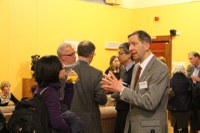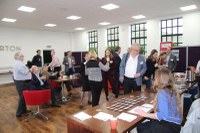Academic researchers from various departments across the University came to the first medical diagnostics and devices workshop – jointly organised by the Bioscience Impact Team and The Office for Translational Research.
Abby Fowden, Head of the School of The Biological Sciences welcomed everyone and defined the overall aim of the workshop - to provide a greater understanding of the routes to market for diagnostics and devices in both industry and academic research.
Dr John Pritchard, a consultant in the field and an Entrepreneur in Residence for the University, chaired the session. An overview of the industry as a whole was given by Doris-Ann Williams the CEO of BIVDA, then David Wilson the Director of Commercial Operations at Asuragen Inc. talked on the evaluation of the commercial potential of a new diagnostic technology. Andrew Ede the co-founder and director of EG Technology spoke about Risk Management through Development in the field of diagnostics and devices. Next was a useful insight into the quality and regulatory considerations in medical devices and diagnostics product realisation from Jim MacKenzie, Quality and Regulatory Consultant at QualiMedd.
The next talk was aimed at showing the audience how to achieve success from your academic research. Frank Craig, Chief Executive Officer of Sphere Fluidics presented how he made the academic research the company was founded on into an industrial success in the area of single cell diagnostic systems.
Finally the last of the industrial speakers was Vaishali Kamat, Associate Director and Head of Digital Health at Cambridge Consultants who gave an enthusiastic presentation on connected healthcare and apps development.
The final speaker of the afternoon was from Ruth Nebauer, the Assistant Director of the Innovations Programmes at the NIHR Funding – i4i Invention for Innovation Programme. Ruth outlined the funding opportunities available from the NIHR and the application process.
John rounded up the session by introducing the Entrepreneur in Residence Scheme to the academics. The University currently has 3 EiRs
available under a CDA to offer advice on translational research.A speaker Q&A Panel including Amanda Wooding of Cambridge Enterprise provided the academics an opportunity to quiz the industry experts.
Some interesting points that came out of the discussion included the following:
- Application in veterinary medicine is quicker and easier than in human healthcare, with often a quicker route to market
- Academics should be looking at un-met need studies as part of their research programmes, interviewing end users to understand if their work could add impact to their day to day work
- In digital health, the opportunities for applications in the developing world are huge as they all have mobile phones – it’s a possible un-tapped area of potential
- One downfall of digital health is that there are limited IP opportunities; the protection is in how you design your service and the level of stickiness you can obtain
- All countries have different regulatory systems - so keep it in mind when developing your technology.
- Getting a clinical expert involved at an early stage can help provide information on how beneficial your technology could be
- Including Cambridge Enterprise in academic research plans as early as possible can be really beneficial to the progress of the project success.
Following the series of talks there was ample opportunity to continue the discussions over drinks and make new contacts with the industry representatives. We’ve had some great feedback from the attendees with even a suggestion of the possibility of a more focussed practical follow on workshop, so watch this space!
Workshop Programme:
| 15:50 | Welcome, Professor Abby Fowden |
| 16:00 |
Overview of Industry as a Whole, Doris-Ann Wiliams, BIVDA
|
| 16:15 |
Evaluation of the Commercial Potential of a new Diagnostic Technology, David Wilson, Asurgen
|
| 16:30 |
Risk Management through Development, Andrew Ede, EG Technology
|
| 16:45 |
Quality an Regulatory Considerations in Medical Device and Diagnostics Product Realisation, Jim MacKenzie, QualiMedd
|
| 17:00 |
Academic to Industrial Success: Single Cell Diagnostics Systems, Frank Craig, Sphere Fluids
|
| 17:15 | Connected Healthcare and Apps Development, Vaishali Kamat, Cambridge Consultants |
| 17:30 |
NIHR Funding - i4i Invention for Innovation Programme, Ruth Nebauer, NIHR
|
| 17:45 | Introduction to Entrepreneur in Residence scheme, John Pritchard |
The Bioscience Impact Team are developing a programme of events and funding to give University of Cambridge researchers the knowledge, skills and contacts they need to fully realise the outcomes of their research. Please see our events page or contact us for more information.


